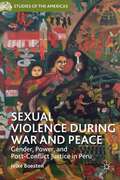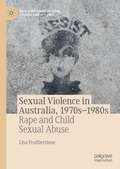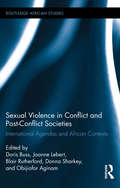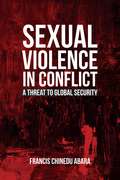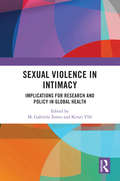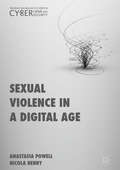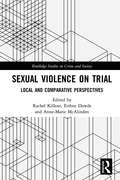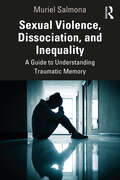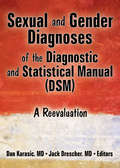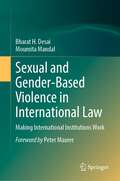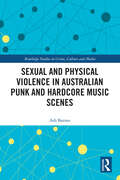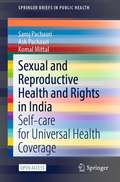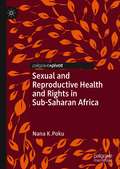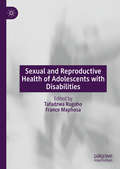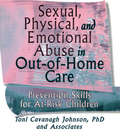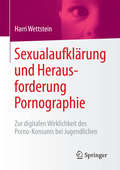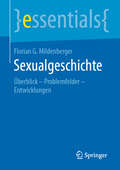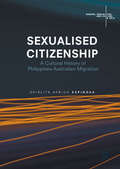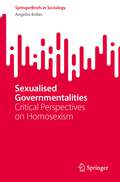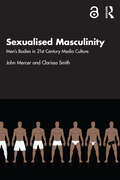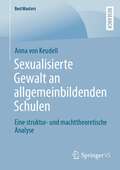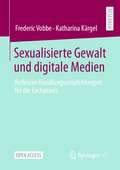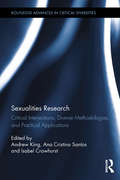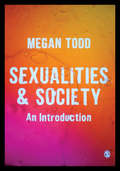- Table View
- List View
Sexual Violence during War and Peace
by Jelke BoestenUsing the Peruvian internal armed conflict as a case study, this book examines wartime rape and how it reproduces and reinforces existing hierarchies. Jelke Boesten argues that effective responses to sexual violence in wartime are conditional upon profound changes in legal frameworks and practices, institutions, and society at large.
Sexual Violence in Australia, 1970s–1980s: Rape and Child Sexual Abuse (World Histories of Crime, Culture and Violence)
by Lisa FeatherstoneThis book explores sexual violence and crime in Australia in the 1970s and 1980s, a period of intense social and legal change. Driven by the sexual revolutions, second wave feminism, and ideas of the rights of the child, there was a new public interest in the sexual assault of women and children. Sexual abuse was studied, surveyed and discussed more than ever before in Australian society. Yet, despite this, there remained substantial inaction, by government, from community and on the part of individuals. This book examines several difficult questions of our recent history: why did Australia not act more firmly to eradicate rape and child sexual abuse? What prevented our culture from looking seriously at trauma? How did we fail to protect victim-survivors? Rich in social and legal history, this study takes readers into the world of victims of sexual crime, and into the wider community that had to deal with sexual violence. At the core of this book is the question that resonates deeply right now: why does sexual violence appear seemingly insurmountable, despite significant change?
Sexual Violence in Conflict and Post-Conflict Societies: International Agendas and African Contexts (Routledge African Studies #18)
by Blair Rutherford Obijiofor Aginam Doris Buss Joanne Lebert Donna SharkeyThis book brings together a unique blend of researchers, civil society and community activists all working on different aspects of conflict sexual violence on the African continent. The contributions included here offer a detailed reading of the social and political climate within which some patterns of sexual violence unfold, and the increased policy and institutional responses shaping post-conflict environments. The chapters are organized around three main themes: the continuities between conflict sexual violence and post-conflict insecurity; the troubling category of "victim" and its representation in post-conflict settings; and the international contexts – such as international programming, aid and justice interventions – that shape how conflict sexual violence is addressed. The authors come to the topic from various academic disciplines - anthropology, gender studies, law, and psychology - and from different non-academic contexts, including civil society organizations in affected regions, and policy and activist organizations in the Global North. Collectively the chapters in this volume offer complex and detailed analysis of some of the debates and dynamics shaping contemporary understandings of conflict sexual violence, highlighting, in turn, new insights and emerging topics on which further research and advocacy is needed.
Sexual Violence in Conflict: A Threat to Global Security
by Francis Chinedu AbaraThe originality of this book rests in the application of the human security framework to analyze sexual and gender-based violence in conflict. The human security paradigm is concerned and centered on the individual's security threats holistically and is i
Sexual Violence in Intimacy: Implications for Research and Policy in Global Health
by M. Gabriela Torres and Kersti YllöIntegrating interdisciplinary and cross-cultural analysis, this volume advances our understanding of sexual violence in intimacy through the development of more nuanced and evidence-based conceptual frameworks. Sexual violence in intimacy is a global pandemic that causes individual physical and emotional harm as well as wider social suffering. It is also legal and culturally condoned in much of the world. Bringing together international and interdisciplinary research, the book explores marital rape as individual suffering that is best understood in cultural and institutional context. Gendered narratives and large-scale surveys from India, Ghana and Africa Diasporas, Pacific Islands, Denmark, New Zealand, the United States, and beyond illuminate cross-cultural differences and commonalities. Methodological debates concerning etic and emic approaches and de-colonial challenges are addressed. Finally, a range of policy and intervention approaches—including art, state rhetoric, health care, and criminal justice—are explored. This book provides much needed scholarship to guide policymakers, practitioners, and activists as well as for researchers studying gender-based violence, marriage, and kinship, and the legal and public health concerns of women globally. It will be relevant for upper-level students and scholars in anthropology, sociology, psychology, women’s studies, social work and public and global health.
Sexual Violence in Western Thought and Writing
by Victor J. VitanzaThis book examines how rape and sexual violencehave become canonized""in the form of rape""stories. Through close readings of a wide array of texts, Vitanza offers an exposition of the ways in which our reading, writing, and thinking practices are complicit in the production of rape culture andlays the groundwork for a newapproach to reading, writing, and thinking. "
Sexual Violence in a Digital Age
by Nicola Henry Anastasia PowellThis book examines how digital communications technologies have transformed modern societies, with profound effects both for everyday life, and for everyday crimes. Sexual violence, which is recognized globally as a significant human rights problem, has likewise changed in the digital age. Through an investigation into our increasingly and ever-normalised digital lives, this study analyses the rise of technology-facilitated sexual assault, 'revenge pornography', online sexual harassment and gender-based hate speech. Drawing on ground-breaking research into the nature and extent of technology-facilitated forms of sexual violence and harassment, the authors explore the reach of these harms, the experiences of victims, the views of service providers and law enforcement bodies, as well as the implications for law, justice and resistance. Sexual Violence in a Digital Age is compelling reading for scholars, activists, and policymakers who seek to understand how technology is implicated in sexual violence, and what needs to be done to address sexual violence in a digital age.
Sexual Violence on Trial: Local and Comparative Perspectives (Routledge Studies in Crime and Society)
by Rachel KilleanSexual Violence on Trial provides a contemporary critical examination of the investigation, prosecution and cultural contexts of sexual violence. It draws on Northern Ireland as a case study, while also drawing on experiences from other jurisdictions across the United Kingdom and island of Ireland. Public and academic debates concerning the high-profile ‘Belfast/Rugby Rape Trial’ and the subsequent Gillen review of the arrangements to deliver justice in serious sexual offence cases have been mirrored at a global level with movements such as #MeToo and #TimesUp. This book brings together the perspectives of practitioners and academics to discuss contemporary challenges surrounding the societal and legal framing of sexual violence. It examines key aspects of the criminal justice process including the challenges of supporting victims; of responding to a range of forms of sexual violence such as rape, peer abuse, intimate partner violence and forced-to-penetrate cases; as well as alternative perspectives and future reforms. It also considers broader debates including balancing the interests of victims and defendants; the impact of cultural myths and stereotypes; the challenges of the digital age; models of consent; legal representation for victims and anonymity and publicity surrounding trials.Written by leading authorities in the field, Sexual Violence on Trial will be of great interest to students and scholars of Criminology, Law and Sociology.
Sexual Violence, Dissociation, and Inequality: A Guide to Understanding Traumatic Memory
by Muriel SalmonaSexual Violence, Dissociation, and Inequality is a book about traumatic memory—or how lived trauma is repeated by victims as if happening again.The author, internationally renowned psychiatrist Muriel Salmona, lays out a convincing argument for the ways in which victims are neurologically compelled to relive trauma and how, with proper treatment, they can fully heal. Informed by decades of clinical practice, research, and activism, Salmona explains how victims’ behaviors are rooted in neurology as normal responses to abnormal situations. In contrast to a climate of victim-blaming denial, Salmona explains how grave the violation of victims’ human rights truly is and what to do about it in terms of care and prevention. She explains in clear language how to reconstruct victims’ narratives, which are often clouded by traumatic amnesia, and thereby reconnect parts of the brain that were severed during the traumatic event.This is a guide for professionals who work with survivors, for survivors themselves, and for anyone committed to understanding and reducing violence and inequality.
Sexual and Gender Diagnoses of the Diagnostic and Statistical Manual (DSM): A Reevaluation
by Jack Drescher Dan KarasicGet the latest on the controversies of the sexual and gender diagnoses contained in the current DSMThe revision of the Diagnostic and Statistical Manual (DSM) is an ongoing process, and changes in criteria or terminology can have significant implications for diagnosis and treatment. Sexual and Gender Diagnoses of the Diagnostic and Statistical Manual (DSM): A Reevaluation provides a range of viewpoints from noted authorities on gender and sexuality issues presently included in the DSM. Arguments for or against revisions of various gender and sexual diagnoses are presented-some may have repercussions regarding insurance reimbursement and patient access to care. This book is certain to raise questions for mental health professionals interested in how cultural influences affect psychiatric diagnoses. Sexual and Gender Diagnoses of the Diagnostic and Statistical Manual (DSM) reviews those controversial gender issues previously seen as being a disorder. The book critically evaluates the medical, psychotherapeutic, and civil rights issues in the diagnosis, assessment, and treatment of GID in children, adolescents, and adults, and presents evidence and debates for its exclusion from the next DSM. Arguments for and against removal of paraphilias from the DSM are explored in detail. Finally, sexual pain criteria for diagnoses are examined, reviewing the latest studies that support or criticize the view that dyspareunia and vaginismus may be better classified as a pain disorder. Sexual and Gender Diagnoses of the Diagnostic and Statistical Manual (DSM) presents controversial debate from experts such as: Robert Spitzer, MD Charles Moser, MD, and Peggy J. Kleinplatz, PhD Walter O. Bockting, PhD, and Randall Ehrbar, PsyD Kelley Winters, PhD Arlene Istar Lev, CSW-R, CASAC Paul Jay Fink, MD and other respected authorities!Sexual and Gender Diagnoses of the Diagnostic and Statistical Manual (DSM) is thought-provoking, enlightening reading for psychiatrists, psychologists, mental health workers, epidemiologists, researchers, educators, and students.
Sexual and Gender-Based Violence in International Law: Making International Institutions Work
by Bharat H. Desai Moumita MandalThis book addresses sexual and gender-based violence (SGBV) against women from an international law point of view. It identifies the reasons behind SGBV against women with a specific focus on cultural practices that try to justify it and highlights the legal challenges related to the topic for both national and international justice systems. The seven chapters of the book are: i) Introduction ii) SGBV a global concern; iii) International legal protection; iv) Role of international institutions; v) Role of cultural factors and vi) Challenges vii) Conclusions. In the light of concerted global efforts to bring to an end, or at least severely contain SGBV against women, the book provides a future roadmap to the United Nations system, States, international institutions, multidisciplinary scholars, civil society organizations and other global actors.The book contains a Foreword by Peter Maurer, President of International Committee of the Red Cross (ICRC).
Sexual and Physical Violence in Australian Punk and Hardcore Music Scenes (Routledge Studies in Crime, Culture and Media)
by Ash BarnesFocused on the Australian punk and hardcore music scene, this book provides an innovative balance between the acknowledgement of harm and the celebration of pleasure in live music spaces.Despite decades of advocacy within vibrant music communities, stories of sexual and physical violence persist. Although anecdotally common in alternative music cultures, the interpretation and experiences of harm have remained absent from criminological analysis. Gradients of harm dictate and frame certain behaviour as ‘unacceptable’ or ‘encouraged’ under specific social conditions. As explored through qualitative research interviews and the author’s lived experience, violence within music scenes is a complex, personal, and collective experience.Issues such as discrimination, social inequality, stereotyping and rape myth acceptance are instrumental in shaping how people in the punk and hardcore scenes fail to recognise, minimize, and dismiss violence in their community. This text questions how and why some people are ‘worthy’ or ‘unworthy’ victims of crime, and why harmful behaviour continues within these spaces.Sexual and Physical Violence in Australian Punk and Hardcore Music Scenes will be of interest to researchers in the field of criminology and sociology but is also applicable to a wider academic audience interested in violence, deviance, and subcultures.
Sexual and Reproductive Health and Rights in India: Self-care for Universal Health Coverage (SpringerBriefs in Public Health)
by Saroj Pachauri Ash Pachauri Komal MittalThis open access book addresses self-care on sexual and reproductive health and rights and HIV prevention and treatment in the most marginalized and vulnerable communities. Case studies and personal narratives are used to share their perspectives and experiences, sources of information for self-care products, motivations for self-care, and challenges and outcomes. Self-care provides the way to reach the last mile in achieving universal health coverage and the Sustainable Development Goals. Issues related to stigma, discrimination and violence among these communities are highlighted. Changes in policies and programs to improve their sexual and reproductive health, education and employment are discussed. The last chapter in the book examines how the agenda on self-care can be advanced in the years ahead. The audience for this publication includes health professionals, researchers, those managing health institutions and service providers.
Sexual and Reproductive Health and Rights in Sub-Saharan Africa (Global Research in Gender, Sexuality and Health)
by Nana K. PokuThis book provides a clear and detailed examination of why it is so difficult to secure comprehensive political engagement and actionable, effective policy on sexual and reproductive health rights in sub-Saharan Africa. In an engaging analysis, Nana Poku employs expert knowledge to examine the prospects for large-scale improvements. He explores not only the full range of normative sensitivities, but also conceptual misunderstandings, legal difficulties and complex challenges of securing and maintaining adequate funding while AIDS remains a pandemic in the region. Up-to-date, succinct yet highly detailed, lucid and compelling in its diagnoses of highly complex issues, this book is a valuable, accessible study of a topic that is regional in focus but with clear global implications.
Sexual and Reproductive Health of Adolescents with Disabilities
by Tafadzwa Rugoho France MaphosaThis book investigates various experiences of teaching sexual and reproductive health to adolescents with disabilities. Following the adoption of the UNCRPD, adolescents with disabilities still commonly suffer from widespread violation of their rights particularly concerning sexual and reproductive health – often being viewed as either asexual or hypersexual. Contemporary societies do not readily encourage the participation of these young people in conversations or decision making processes concerning their own sexual and reproductive health. This book delves into such complex issues, critically examining how global communities attempt to teach sexual and reproductive issues to adolescents with disabilities in the modern era.
Sexual, Physical, and Emotional Abuse in Out-of-Home Care: Prevention Skills for At-Risk Children
by Toni Cavanaugh JohnsonSexual, Physical, and Emotional Abuse in Out-of-Home Care brings into the open current or past sexually, physically, or emotionally abusive behaviors between children or between children and their caregivers in out-of-home care and helps prevent future victimization. The curriculum gives you 20 exercises that promote respectful and nurturing interactions among caregivers and children by offering healthy concepts of touching, communication, and boundaries. By implementing the concepts in this curriculum, you’ll help create positive, healthy attachments for children in out-of-home care who may feel abandoned and alone. Exercises in Sexual, Physical, and Emotional Abuse in Out-of-Home Care assist children and caregivers in understanding their rights and others’rights in residential treatment centers and group or foster homes. Exercises focus on: communication on a continuum--teaches children and staff about their own communication and the communications they receive from others a touch continuum--provides an excellent vehicle for discussing the comforting and soothing touch children need and how to differentiate this from eight other types of touch differentiating sexual play from problematic sexual contact between children--helps children and staff talk about sex personal space and boundaries--discusses these as areas of major violations in children who have been abused sexual knowledge--teaches the body parts and their functions discovering what a sex offender does to trick children into situations that end up in sexual abuse--asks the children to make rules that assist other children to recognize unsafe situations, and then gives them the opportunity to create a video, pamphlet, advertisement, or commercial to tell other kids these rulesThis curriculum is unique because it can be completed through children and adults talking together. It assumes that there will be difficulties and conflicts between staff and children and among children themselves and provides a forum in which to raise and discuss these issues. You’ll find the curriculum perfect for caregiver training or as exercises caregivers and children do together. You’ll also find it very useful for working with children’s families either in family sessions or in multifamily groups.
Sexualaufklärung und Herausforderung Pornographie
by Harri Wettstein Jakob PastötterDas Buch bietet auf der Grundlage einer wissenschaftlichen Studie Orientierungswissen zum Phänomen des digitalen Konsums von Pornos bis hin zur Sexsucht im Jugendlichenalter. Das Werk stellt das Thema kontrastierend, manchmal auch provozierend in den Kontext eines natürlichen Verständnisses von Sexualität. Es geht um Primärprävention im Sinne von psychischen Schutzmaßnahmen, die einen aufgeklärten Umgang mit dem Thema ermöglichen. Damit hilft das Werk, die Sprach- und Hilflosigkeit staatlicher Institutionen zu überwinden. Aufgrund der besonderen Expertise des Autors werden dabei auch Fragen der Fruchtbarkeit ausgehend vom Frauenzyklus behandelt. Ein einführender wie auch ein ergänzender Beitrag von Jakob Pastötter ordnen die Ergebnisse in den Forschungskontext ein. Ein dauerhaft aktuelles Thema, ein anregendes Buch, das Eltern, Psychologen, Ärzte und Pädagogen informiert - und der gesellschaftspolitischen Diskussion förderlich sein dürfte.
Sexualgeschichte: Überblick – Problemfelder – Entwicklungen (essentials)
by Florian G. MildenbergerDie Sexualgeschichte ist keine eigenständige Disziplin, sondern Teilaspekt natur-, geistes- und sozialwissenschaftlicher Fächer sowie häufiges Thema gesellschaftspolitischer Diskussionen. Florian G. Mildenberger zeigt historische Entwicklungen, gesellschaftliche Diskurse und Problemfelder von der Antike bis zur Gegenwart auf, beschreibt sie überblicksartig und stellt weitere Literatur für eigene Studien bereit.Der Autor:Dr. Florian G. Mildenberger ist Professor am Institut für Geschichte der Medizin der Robert Bosch Stiftung in Stuttgart und forscht vorrangig zu Geschichte, Entstehung und Bedeutung heilkundlicher, sozialer und sexueller Subkulturen im 19./20. Jahrhundert.
Sexualised Citizenship
by Shirlita Africa EspinosaThis book considers the intersections of race, gender and class in multicultural Australia through the lens of migration to the country. Focusing on Philippines-born migration, it presents the profile and history of this minority group through an examination of their print material culture over the last 40 years. Particularly, it examines the growth of the production of Filipino cultural identity and the politics of community building in relation to the sexualisation of their acquired citizenship. Given the promotion of Australia as a modern, multicultural, Western nation in the Asia-Pacific region, the book questions the bases on which this claim stands using the example of Filipino settlement in Australia. Considering the social contradictions that continue to shape multicultural politics in Australia, it examines how the community makes sense of its migration through print material culture. The book analyses the community's responses to their minoritisation to understand how Filipino-Australian migration-- the affective and economic appropriation of women's labour--is instructive of the social reality of millions in the global diaspora today. Based on archival and ethnographic research, this text straddles the interdisciplinary fields of gender and cultural studies, and is a key read for all scholars of Asian and Australian area studies.
Sexualised Governmentalities: Critical Perspectives on Homosexism (SpringerBriefs in Sociology)
by Angelos BollasThis book critically examines the concept of sexualised governmentalities, a framework for understanding the evolving discourse and power dynamics surrounding discrimination on the basis of sexual practices. Central to this exploration is the shift from traditional heteronormative perspectives to a more complex hetero/homonormative context, where the structure and organisation of sexual relationships gain prominence over the gender or sexual orientation of the participants. A key focus of the book is the concept of homosexism within the realm of gay masculinity studies. The author discusses homosexism as a form of discrimination experienced by gay men from other gay men, highlighting the influence of heteronormative patriarchal society on these interactions. It calls for a broader recognition and acceptance of diverse sexual expressions and challenges the reader to re-evaluate the societal norms around masculinity and sexual behaviour. Sexualised Governmentalities is an important contribution to the discourse on sexual identity and practice, offering insights for a more inclusive and empathetic understanding of sexual diversity.
Sexualised Masculinity: Men’s Bodies in 21st Century Media Culture
by John Mercer Clarissa SmithSexualised Masculinity: Men’s Bodies in 21st Century Media Culture explores evolving portrayals of masculinity in contemporary media, focusing on the increasing eroticisation of the male body.This book examines how traditional and digital media – from films and television to social media platforms and fashion – have transformed the ways masculinity is represented and perceived. Through a wide array of case studies, it highlights how male bodies are now sites of erotic value, challenging long-standing norms and expectations. By exploring both global and local media, John Mercer and Clarissa Smith provide insights into the shifting landscape of gender and sexuality, offering a critical perspective on how masculinity is consumed, performed, and commodified in today’s world.This book is essential for students and scholars in fields such as gender studies, media studies, cultural studies and social history, and is particularly relevant for those interested in understanding the intersections of masculinity, media and sexuality in the 21st century.
Sexualisierte Gewalt an allgemeinbildenden Schulen: Eine struktur- und machttheoretische Analyse (BestMasters)
by Anna von KeudellIn diesem Buch werden allgemeinbildende Schulen struktur- und machttheoretisch untersucht, um Gelegenheitsstrukturen in der Schüler*innen-Lehrer*innen-Beziehung für die Verübung sexualisierter Gewalt zu erkennen. Mit Hilfe einer Zusammenführung von Forschungsergebnissen zu sexualisierter Gewalt, dem Vier-Faktoren-Modell von David Finkelhor, mit dem Machtverständnis von Michel Foucault beleuchtete Schulstrukturen sowie einer Auswahl an Antinomien pädagogischen Handelns nach Werner Helsper wird eine Perspektive eingenommen, die den ,ganz normalen Alltag‘ in Schulen untersucht. Es wird herausgearbeitet, inwiefern und wodurch in diesem Alltag aus Routinen und Regeln Gelegenheitsstrukturen zur Verübung sexualisierter Gewalt entstehen, was diese begünstigt und wann und wie diese (aus-)genutzt werden können. In der Ergebnissicherung der Analyse werden die erkannten Gelegenheitsstrukturen aufgeführt und, auf deren Grundlage, im Ausblick Empfehlungen für die Entwicklung von Schutzkonzepten an Schulen erarbeitet.
Sexualisierte Gewalt und digitale Medien: Reflexive Handlungsempfehlungen für die Fachpraxis
by Frederic Vobbe Katharina KärgelIn dieser Open-Access-Publikation stellen Katharina Kärgel und Frederic Vobbe anhand sieben typischer Fallbeispiele Handlungsempfehlungen für einen adäquaten Umgang mit mediatisierter sexualisierter Gewalt dar. Die Empfehlungen sind das Ergebnis des vom Bundesministerium für Bildung und Forschung geförderten Projekts „HUMAN“. Sie wurden empirisch unter Beteiligung von Betroffenen sowie Expert*innen der Bereiche Recht, Psychologie, Pädagogik und Soziale Arbeit entwickelt. Sie umfassen jeweils Fallreflexionen sowie konkrete Handlungsansätze.Digitale Medien sind Instrument und Kontext sexualisierter Gewalt gegen Kinder und Jugendliche. Sie müssen bei Übergriffen durch zuvor fremde wie nahestehende Personen stets mitbedacht werden. Ihr Einsatz verstetigt die Belastungen Betroffener und führt zu einer hohen Komplexität von Interventionen.
Sexualities Research: Critical Interjections, Diverse Methodologies, and Practical Applications (Routledge Advances in Critical Diversities)
by Andrew King, Ana Cristina Santos and Isabel CrowhurstHow is sexuality studied methodologically? How are we innovating, methodologically, in the study of sexuality? What impact, if any, has the increase in mixed methodologies had on the study of sexuality? Sexualities Research brings together original contributions by emerging and world-leading scholars of sexuality. Through this volume the authors seek to address how theoretical and methodological choices enable wider dissemination and social impact of sexualities research. Indeed, covering a diverse range of theoretical perspectives and methodologies to provide important new insights into human sexuality, the chapters cover an array of topics from the experience of researching sexuality, to using theories in new and innovative ways. With an international scope, Sexualities Research also builds on the re-emergence of the European Sociological Association Sexuality Research Network and asks important questions about the study of sexuality in contemporary societies against the background of political upheaval and economic troubles. Certainly, this collection shows the importance and vitality of sociological understandings of human sexuality in the twenty-first century. An enlightening volume consisting of a variety of case studies and theoretical research, Sexualities Research will appeal to undergraduate and postgraduate students, as well as postdoctoral researchers who are interested in fields such as Sociology, LGBT/Queer Studies and Gender Studies.
Sexualities and Society: An Introduction
by Megan ToddSexualities and Society adopts a fresh, sociological perspective to explore the development of sexualities across both public and private spheres, giving thoughtful consideration to heterosexualities, cis, bi and trans identities. Divided into three parts, the book starts with an exploration into the history of sexuality, before covering the key theories, and how research into sexualities has been, and could be, conducted. Parts two and three examine how sexualities are framed by cultural factors and social institutions – including the media, religion, and politics – and considers the impact of how significant issues such as identity, age, health and violence relate to sexuality. Employing a range of international case studies, up to date policy developments, and engaging learning features such as ‘discussion points’ and ′fact file′ sections, this book is essential reading for students studying sexuality across sociology, social policy, social care, media, and politics.
